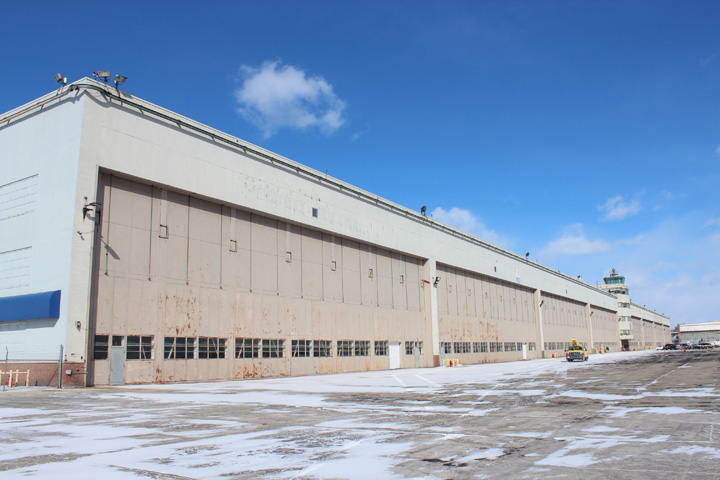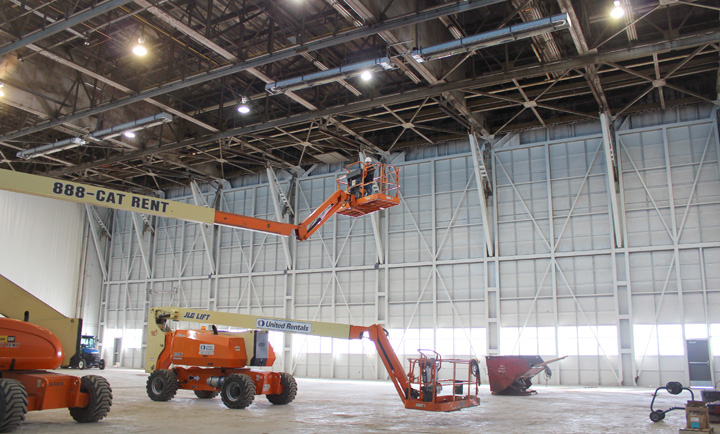Willow Run Airport heats up plans to improve facilities
Date Posted: March 14 2014

YPSILANTI TWP. – How do you efficiently heat an airplane hangar? Traditional forced air, steam and hot water systems have their applications in residential and business settings, but when it comes to keeping workers comfortable in the wide-open spaces of an airplane hangar in the wintertime, it seems it’s hard to beat infrared heating.
And that’s what Advanced Radiant Systems and a small crew of building trades workers are doing at the historic Hangar No. 1 at Willow Run Airport. They’re removing an old, existing steam system and installing a replacement $1.2 million radiant system that should cut heating bills at the massive hangar by 35 percent. The project started in January and is expected to wrap up in July.
“We put these systems in all over the country, it’s the most efficient radiant heat on the market,” said Advanced Radiant Systems Project Manager Darrell Gray. “There’s lots of open space to do the work, I guess the real challenge is coordinating everything around the aircraft.”
The project involves the removal and scrapping of the old heating system, and installation of infrared heat in the eight bays of Hangar 1, encompassing about 200,000 square feet among eight roughly equally sized aircraft bays. Work is complete on Bays 2, 3 and 4, and was ongoing late last month in Bay 1. The trades will also convert the heating system in Bays 5-8. Bay 8 is used by the Yankee Air Force to house some of its historic aircraft.
“It is nice to have all this room and not to have to be elbow to elbow out here,” said Steve Benyi, the Plumbers Local 98 foreman on the project for Progressive Mechanical. “But sometimes you come to work and there’s a plane in the hangar you weren’t expecting. So, we work around it.”
Infrared radiant heating technology has been around for decades. Ceiling or highly mounted, the natural-gas fired units don’t blow hot air, they heat objects. The heat radiates downward, and then rises. “It’s a slow, nice, heat,” Gray said. “It takes a while to get going, but it’s steady and very efficient.”
Benyi agreed. “You open the big bay doors up, and all the heat doesn’t go away.” He added: “But with this winter, on zero degree days, oh yeah, it still gets cold in here for a while after the bay doors are opened and closed.”
The Hangar No 1 complex was completed in 1942 along with the rest of the Willow Run plant. The plant was built on a portion of 1,878 acres of land owned by Henry Ford, whose company built B-24 bombers during World War II. At full production, the plant would have 90 B-24s at some stage of construction on any given day, eventually producing one finished plane per hour.
Benyi said he has a personal connection to Hangar 1. His late grandmother Rosemary was one of the “Rosie the Riveters” (but not the iconic Rosie behind the image who got all the publicity) who assembled bombers at the plant and worked in the hanger he’s upgrading. “For me, there’s a bit of nostalgia here,” he said.
Today, the facility’s owner, the Wayne County Airport Authority, is making an effort to upgrade the airport and to continue to make it a more appealing, less-congested alternative to Metro Airport. Since nearby Wayne County Metropolitan Airport opened in 1958, Willow Run Airport has become more of a freight-moving facility, especially for the automotive industry. Six of Hangar 1’s bays are leased, with space taken mostly by cargo air companies as well as private passenger service.
Last spring Willow Run, owned by the Wayne County Airport Authority, released a 10-year plan to upgrade the entire facility. The beginning of the plan includes the ongoing heating radiant installation plus fire sprinkler and office space HVAC upgrades to Hangar 1.
By the end of this year the airport’s main runway will have been completely torn up and replaced. The airport is seeking a total of $182 million in state and federal dollars to realign taxiways, remove one of four jet runways and lengthen the main runway to allow fully loaded 747s to take off. Currently 747s can take off at Willow Run, but only with a reduced fuel load.
“The improvements we’re making at Hangar 1 should help us with our existing clients, and to market the airport to others,” said Sean Brosnan, the airport’s director. “Long-term, we want to be positioned to make us more competitive to attract more cargo airlines and other carriers.”

THE HISTORIC, 200,000-square-foot Hangar No. 1 at Willow Run Airport is getting a new infrared heating system. The hanger dates to World War II and was used to accomodate B-24 bombers.

GOING UP in Bay 2 of Hangar No. 1 at Willow Run Airport is Foreman Steve Benyi of Plumbers Local 98, working for Progressive Mechanical. The plumbers have installed the blue-sided infrared heaters hanging from the rafters.

CUTTING UP AN OLD heating unit for scrap in Bay 1 at Willow Run Airport’s Hangar No. Hangar is Rick Conquest of Laborers Locl 1191. He’s employed by 21st Century Salvage.
